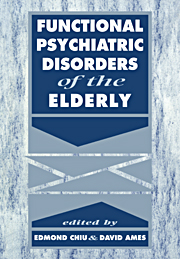Book contents
- Frontmatter
- Contents
- List of contributors
- Preface
- Introduction – A personal note
- Acknowledgement
- Part 1 Classification
- Part 2 General epidemiology
- Part 3 Neuroses
- Part 4 Affective disorders
- Part 5 Psychosexual disorders
- Part 6 Substance use and abuse
- Part 7 Schizophrenia and related psychoses
- Part 8 Psychological, biological and medical issues
- Part 9 Treatment methods
- Part 10 Conclusion
- A concluding overview
- Index
A concluding overview
from Part 10 - Conclusion
Published online by Cambridge University Press: 13 November 2009
- Frontmatter
- Contents
- List of contributors
- Preface
- Introduction – A personal note
- Acknowledgement
- Part 1 Classification
- Part 2 General epidemiology
- Part 3 Neuroses
- Part 4 Affective disorders
- Part 5 Psychosexual disorders
- Part 6 Substance use and abuse
- Part 7 Schizophrenia and related psychoses
- Part 8 Psychological, biological and medical issues
- Part 9 Treatment methods
- Part 10 Conclusion
- A concluding overview
- Index
Summary
In everyday clinical work, whether in family or specialist practice, management of functional psychiatric disorders in the elderly is of prime importance. This importance lies in the number of patients presenting with these complaints and the effective treatments that are now available. The early 1990s are an appropriate time to review our present knowledge of these disorders. The editors have asked a group of workers from different parts of the world to write about their particular areas of expertise. Contributors have been asked not only to focus on current knowledge but on areas where research is needed and would be possible with available methods of study. These research ideas are amongst the most interesting aspects of this book.
Until the 1950s mental illnesses in the elderly were synonymous with organic brain disease. Even depressive and paranoid syndromes were attributed to underlying brain disease. Martin Roth's study of the natural history of mental disorders in old age, published in the Journal of Mental Science in 1955 showed two important findings. Firstly, a two-year outlook for a senile/arteriosclerotic group of patients in hospital was quite different to that of a depressed/paranoid group of hospital in-patients. There was a very high mortality in the first group and a very low mortality in the second.
The study also showed that these depressed/paranoid syndromes – the functional illnesses – accounted for more than half of hospital admissions.
- Type
- Chapter
- Information
- Functional Psychiatric Disorders of the Elderly , pp. 605 - 607Publisher: Cambridge University PressPrint publication year: 1994



